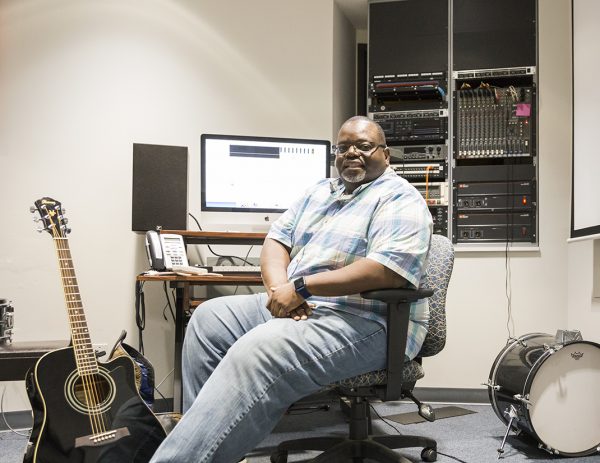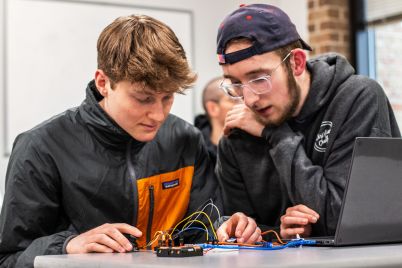
By Charlotte Young Bowens
Staff Writer
How did you end up teaching at WCC?
I’ve been here for 17 years and when the Music department decided they wanted to add some computer based music technology, Mike Naylor, Professor of Performing Arts, he reached out to me because I had a history with using computer technology or what was then called midi sequencing versus what we do now which is actual digital audio. I started teaching a class called computer applications in music, and we started with five computers in the back of the piano room. We taught students, what was then the technology being embraced by the music industry, midi sequencing and not the emerging technology. Now that the department has grown and changed, the use of computers in music and audio production has evolved. The focus back then was on music production, now we focus on audio and sound production for more than just music.
How did that love of music happen for you?
In 1968, when I was 8-years-old, I went to see James Brown in St. Louis, MO and I knew from that moment on, I wanted to somehow be involved with music. As a kid I first picked up the clarinet but quickly went to the saxophone, another wind instrument. Then I went to bass guitar while in high school which became my main instrument for a while. I’ve been playing professionally since I was 16-years-old.
What courses do you teach?
MUS 175: Audio Recording Technology (Pro Tools certification). Pro Tools is the audio recording standard for 85 percent of the industry and it’s a software that our students can attain certification. To become Pro Tools certified is an added bonus to the audio production and engineering certificate program. Many students come into the course wanting to create their music but soon discover many career opportunities in audio production. Music is used in a variety of television programs, videos,film, video games and stage. We also offer DANTE certification for those focused on audio engineering.
What is your favorite thing about this school?
The diversity of students. It’s my favorite and also my pain point. I can have a high school student to a retired person returning to college after a long time or persons attending college for the first time. Some of these individuals have limited computer experience and it’s a challenge as a instructor to educate these different types of learners. It can be challenging because sometimes young people don’t want to learn all the steps, they just want to know what they need to do to make it work. And then some of the older students want to know every little step, so it’s a challenge to balance those things.
When you’re not teaching, what else do you do?
During the day I’m the Executive Director of Peace Neighborhood Center [the center is a community based service provider to children, families, and individuals who are affected by social and economic challenges. Through a wide range of comprehensive programs designed to promote education, health, well-being and fiscal independence, Peace has serviced more than 16,000 people in Ann Arbor and Washtenaw County since 1971. Peace helps people discover options, enhance skills, and make choices that lead to self-sufficiency and positive community involvement.
But what’s exciting is I’ve recently rebranded my company Double B Music Group, LLC with a focus on music licensing for film and television. I’ve joined forces with another local musician, Brian Young, we are creating a library of music and working with an agent in an effort to get our music placed with producers needing original compositions. This is an emerging area for musicians with significant growth because of the explosion, the need for quality composition for television, video games, and virtual reality productions.
What have your students taught you?
Stay on top of the game in this industry because students have access to all the newest trends and things change so quickly. The most important thing I’ve learned is, ‘don’t think you know everything’ and understand that you can learn from students as much as they can learn from you, it’s a two way street. I regularly learn from my students.
What do you want the world to know about music?
Music is the language that we all speak, that speaks to everybody and everybody understands. Even if I don’t understand your verbal language, I can close my eyes and connect with you through music, it’s universal. That’s why it’s so exciting, this is why I’m involved with music because it’s universal.


